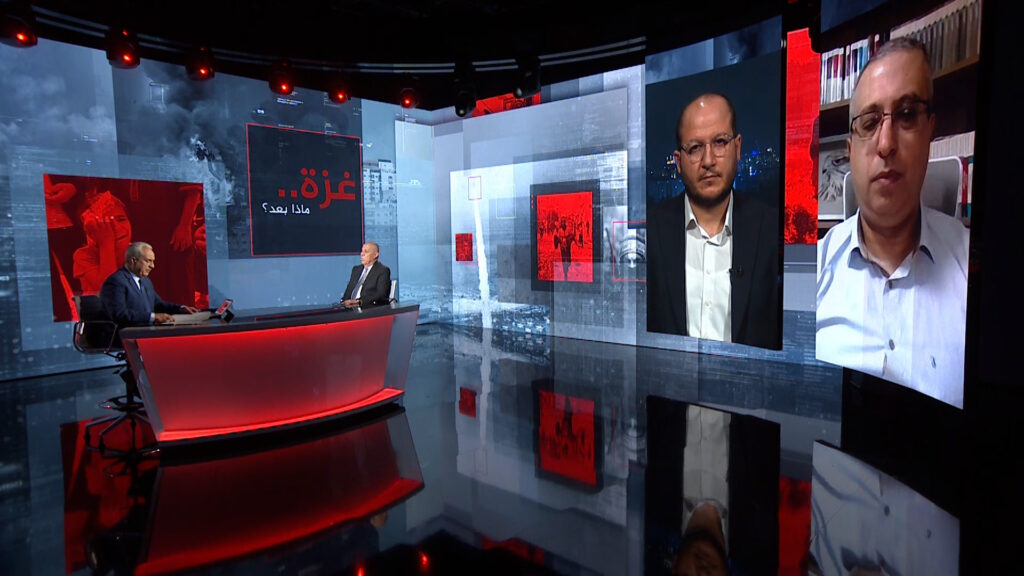Experts agreed that the Israeli military side prefers to withdraw from Philadelphia because staying would hinder reaching an agreement, and that a Knesset vote to stay in this axis would mean killing all prisoners and ending the negotiations.
Israeli affairs expert Dr. Muhannad Mustafa believes that Defense Minister Yoav Galant’s opposition to remaining in the Philadelphi corridor stems from his military view of the issue, explaining that Galant believes that there is no benefit in remaining there, and that releasing prisoners is more important than remaining in the corridor, a position that the military and security establishment agree on.
While he explained that Israeli politicians are dealing with the issue of the Philadelphi Corridor from an “ideological” perspective, indicating that Prime Minister Benjamin Netanyahu practically wants to occupy the Gaza Strip, which is the strategic goal of this government.
The expert on Israeli affairs warned that the Islamic Resistance Movement (Hamas) agreeing to the occupation army remaining in the axis is tantamount to signing a “surrender document” and giving Israel the opportunity to occupy the Strip without bearing responsibility for the losses among the civilian population.
He pointed out that Galant’s statement that “Israel is at a strategic turning point” can be viewed from several perspectives related to the war on Gaza, explaining that remaining in the Philadelphi corridor means occupying the Strip and requires the presence of the army there.
Strategic Turns
This means – according to Dr. Mustafa – a return to the situation before 2005, which carries multiple strategic twists for Israel, represented by the failure to resolve the northern front and the internal front with regard to the recruitment of the Haredim, in addition to the rebellion that the Israeli government has begun to show against the judicial system and its rulings, and its failure to comply with it.
He ruled out that Netanyahu would dismiss Galant now because that would increase the pressure of the Israelis against this decision, and Netanyahu wants to maintain some kind of internal calm in his government.
For his part, military and strategic expert, Major General Fayez Al-Duwairi, considered that Israel’s insistence on remaining in Philadelphia comes according to a military point of view, despite the statements of Israeli military leaders that can be summarized as follows: the Rafah Brigade has been eliminated and 80% of the tunnels have been destroyed, and the military side says “we can withdraw and return in a very short time to regain control.” This indicates that the military side prefers withdrawal because remaining would hinder reaching an agreement.
The military expert pointed out that Netanyahu does not want to reach an agreement at all, and insists on forcing Hamas to make more concessions, after it gave up the principle of “all for all.”
For his part, political and strategic affairs researcher Saeed Ziad disagreed with Major General Al-Duwairi in his opinion about the importance of the axis, and said that controlling Philadelphia has no strategic or operational value, but rather is a political matter, and merely a “stick” that the occupation is inserting into the “wheels” of the deal to disrupt it.
existential threat
The researcher pointed out that the Knesset’s consensus to remain in the Philadelphi axis is a vote to kill all prisoners, and means the final mercy bullet for the so-called deal or negotiations, and it is also a “slap” in the face of the mediators and all those who tried to heal the rift between Israel and the resistance.
In his opinion, the resistance has put Israel on the brink of an existential threat, something that Israel will not forget. He explained that the battle will most likely lead to an existential threat to Israel and make the dream of the “Promised Land” unachievable.
On the tactical level, the political affairs researcher believes that the resistance and its popular base are paying the greatest price for this war, but he believes that the security leaders’ call for withdrawal indicates that they want to follow the example of the late Israeli Prime Minister Ariel Sharon when he approved the plan for disengagement and withdrawal from Gaza when 164 of his soldiers were killed, at the height of the clash during the Al-Aqsa Intifada between 2000 and 2005.
But on the other hand, he confirms that Netanyahu does not want to withdraw and does not see that the Philadelphi Corridor will turn into a death corridor like the Netzarim Corridor, where 31 Israeli soldiers were killed by shells, mortars and Rajum rockets, stressing that many times that number will be killed in the Philadelphi Corridor.
Speaking about the mediators’ position, the researcher said that the decision is in the hands of the resistance, which announced that the negotiations had collapsed and were useless, pointing out that all the points that Netanyahu was betting on achieving had fallen: replacing Hamas, occupying northern Gaza, eliminating the resistance, and displacing the population.

